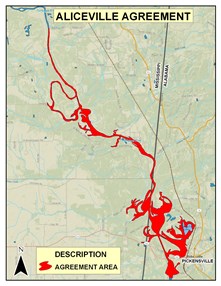
If you have questions about purchasing a license call 1-800-5GO-HUNT.
Mississippi has Reciprocal Agreements with Alabama, Arkansas, Louisiana, and Tennessee. These agreements govern fishing and hunting along state lines.
Mississippi has reciprocal license agreements with Arkansas and Louisiana that allow a Mississippi Resident License (sport or commercial) to be valid to fish in the Arkansas or Louisiana side of lakes or streams that share a boundary with Mississippi.
Residents of either state are bound by the regulations, gear usage, and creel and length limits of the state they are fishing in--not by the regulations of the state they are licensed with--when fishing in the border waters of the other state that did not issue them a license.
Daily creel limits for black bass (largemouth, spotted, and smallmouth), bream, crappie, striped bass, and striped bass hybrids in waters adjoining adjacent states (border waters) shall be that of the adjacent state, or the Mississippi limit, whichever is greater.
The Reciprocal Agreement between MS and AL states that the sport fishing licenses of either Alabama or Mississippi will be recognized in "all that part of the Tennessee River and its embayments and impoundments between the junction of the Tennessee-Alabama-Mississippi line and a north-south line projected across the Tennessee River from the eastern end of the Old Riverton Lock (mile marker 226.6), except and exclusive of that part of the Bear Creek embayment lying south of the Southern Railway bridge". (Signed September 1960)
The Mississippi Department of Wildlife Conservation has signed a Reciprocal Agreement with the Alabama Department of Conservation and Natural Resources concerning sport fishing on Aliceville Lake in Noxubee and Lowndes Counties, Mississippi. Said agreement states that the sport fishing licenses of either Alabama or Mississippi will be recognized in "all that part of the Tombigbee River, its embayment and impoundments, from River Mile 322 to the Aliceville Lock and Dam". (Effective November 15, 1987)

The Mississippi Commission on Wildlife, Fisheries, and Parks at a meeting in Jackson on June 27, 2000, under authority of Section 25-43-9, Mississippi Code of 1972, make known its intent to adopt the following regulations under Mississippi Code of 1972 relative to the reciprocal license agreement on the Mississippi River between the State of Mississippi and the State of Arkansas.
The Mississippi Department of Wildlife, Fisheries, and Parks and the Arkansas State Game and Fish Commission hereby enter into a cooperative agreement to recognize the resident sport fishing licenses, resident hunting licenses, and the resident commercial fishing licenses of the two states on the flowing waters of the Mississippi River and all public waters between the main levees of the Mississippi River of the two states, excluding the St. Francis, White, and Arkansas Rivers; this exclusion also includes all oxbow lakes whose entrance requires passage through the mouth of the St. Francis, White, and Arkansas Rivers.
The following provisions shall apply:
Resident hunting and resident sport fishing licensees of either state shall abide by all laws and/or regulations pertaining to seasons, daily bag and creel limits, possession limits, size limits, tagging requirements, and all other laws and/or regulations of the state in which the hunting or fishing takes place.
For the purposes of this agreement, the state line will be that depicted on the U. S. Department of Interior, Geological Survey quadrangle maps.
Nothing herein shall be construed to allow any person to hunt, fish, or go upon the lands of another landowner or entity without their permission for recreational purposes. Floodwater which has overflowed the natural banks of a public waterway in Mississippi is not a part of the public waterway.
This agreement may be canceled by either the Director of the Arkansas State Game and Fish Commission or the Executive Director of the Mississippi Department of Wildlife, Fisheries, and Parks upon sixty days written notice.
This adopted public notice will become effective August 25, 2000.
The Mississippi Commission on Wildlife, Fisheries, and Parks at a meeting in Winona, Mississippi on November 27, 2000, under authority of Section 25-43-9, Mississippi Code of 1972, made known its intent to adopt the following regulations on Reciprocal Agreements. This is done under authority of Section 49-7-135 of the Mississippi Code of 1972 as follows:
Be it ordered that Public Notice 2358 is hereby repealed and the following rules and regulations relative to the MS-LA reciprocal agreement are adopted:
The Louisiana Department of Wildlife & Fisheries and the Mississippi Department of Wildlife, Fisheries, and Parks hereby agree to enter into a cooperative agreement to allow properly licensed residents of the two states to hunt and fish on waters of the Mississippi River and along the Pearl and East Pearl Rivers, and the lands and waters described below where they form the common boundary between the two states.
Resident licensees of either state shall abide by the creel limits, daily bag limits, possession limits, size limits, length limits, gear restrictions, gear tagging requirements, and equipment restrictions in accordance with the laws and regulations of the state where the licensee is engaged in hunting, sport fishing, and/or commercial fishing.
For the purposes of this agreement, the state boundary line will be that depicted on the U.S. Department of the Interior, Geological Survey quadrangle maps.
Nothing herein shall be construed to allow any person to hunt, sport fish, commercial fish, or go upon the lands of another landowner or entity without their permission for these purposes. Floodwater which has overflowed the natural banks of a public waterway in Louisiana and Mississippi is not a part of the public waterway.
This agreement shall be submitted by both departments to their respective Commissions for approval.
Upon the execution of this agreement, the stipulations and provisions herein shall immediately become effective, and enforcement officers assigned to these areas shall immediately be notified of such by their respective departments.
This reciprocal license agreement supersedes all previous reciprocal license agreements and the most current previous reciprocal license agreements approved by both states dated October 18, 1961 (Miss. River sport fishing & hunting), February 26, 1969 (Miss. River commercial fishing), December 20, 1983 (Pearl River, hunting and fishing), and the interim waterfowl enforcement agreement approved by both states dated December 17, 1999.
This agreement may be canceled by either the Secretary of the Louisiana Department of Wildlife & Fisheries or the Executive Director of the Mississippi Department of Wildlife, Fisheries, and Parks upon sixty days written notice.
This adopted public notice will become effective January 19, 2001.
The reciprocal agreement between MS and TN states that the sport fishing licenses of either Tennessee or Mississippi will be recognized in "all that part of the Tennessee River and its embayments and impoundments between Pickwick Dam to Alabama-Mississippi-Tennessee State Line waters west of the main channel of the Tennessee River from south of state border to a North-South Line projected from Eastport on the south side across the Tennessee River including all portions of Indian Creek and that portion of Yellow Creek upstream to U.S. Highway 25 Bridge".
Access all rules and regulations associated with the Mississippi Department of Wildlife, Fisheries, and Parks to ensure compliance and safety.